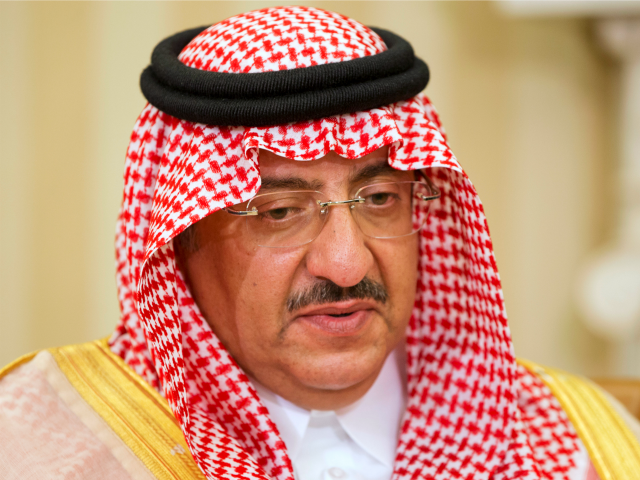When 57-year-old Mohammed bin Nayef was replaced as Crown Prince of Saudi Arabia by 31-year-old rock-star royal Mohammed bin Salman last week, the shakeup in the royal line appeared to be amicable.
Hugs and kisses were exchanged. Nayef said he was “content” to give up the Crown Prince position, along with just about every other position he held in Saudi government, and get some much-needed rest.
Evidently, the King wants to help Nayef relax because he has reportedly been confined to his palace on the Red Sea. The New York Times (NYT) cited “four current and former American officials and Saudis close to the royal family” for its account of what looks suspiciously like house arrest. All of these sources requested anonymity to preserve their relationships with the Saudi royal family.
Nayef has a net worth of about $6 billion, so we may rest assured his palace is comfortable, but his confinement seems to be a surprising deviation from the Saudi media narrative of a buttery-smooth transition. One of the U.S. officials quoted by the NYT speculated that Nayef was essentially asked to lay low and avoid the spotlight until the new Crown Prince, frequently referred to by his initials “MBS,” is secure in his position.
The major hitch in this theory is that Nayef has close relations with a number of American officials due to his years of running Saudi intelligence, and his American colleagues say they have not been able to formally communicate with him since he was put on palatial ice. Some of these officials told the NYT they were privately angry about how Nayef was being treated but refrained from speaking out in public because they didn’t want to damage U.S.-Saudi relations, particularly during the Qatar crisis.
Other disturbing notes include: one former American official said Nayef’s daughters have also been confined to the palace, while both Saudi and American sources told the NYT that Nayef’s palace guards have all been replaced by Prince Salman’s loyal operatives.
The NYT report implies one of the reasons for keeping Nayef incommunicado is that he is a leading figure in the old guard of Saudi royalty, and the monarchy is currently upending tradition by putting younger royals like MBS in key positions of power, sometimes making them direct superiors to their older relatives.
A senior Saudi official dismissed the New York Times report as “untrue, completely false, and baseless” in a CNN interview on Thursday.
“Nothing has changed for Prince Mohammed, except for stepping down from his government positions. He hosts guests and leaves his house on a daily basis since he has stepped down. Further, there are no restrictions on his movement whatsoever, either in or outside of Saudi Arabia,” the Saudi official said. He went on to suggest the Times report was based on “unfounded rumors” started by Iran.
The UK Guardian collected a smattering of other categorical denials from Saudi officials, plus one source who said it is true that Nayef has been asked to stay at his palace for a little while during the changeover period, but he’s not under house arrest.
This particular source said Nayef was asked to stay at his palace mostly because the monarchy doesn’t want him “jetting off to Washington in a bad mood and telling anyone, even our allies, the state secrets.”

COMMENTS
Please let us know if you're having issues with commenting.